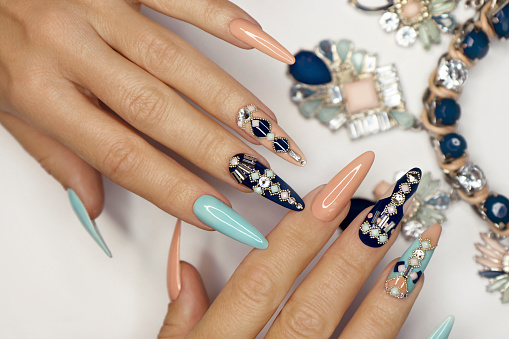Acrylic nails are generally safe and will not hurt your natural nails. Some ladies may notice a slight darkening or coarsening of their natural nails when they wear acrylic nails. A more serious issue that may arise as a result of acrylic nails is a nail infection.
Sometimes a gap forms between your acrylic and natural nails; for example, if your acrylic nail is bumped or shaken, it may detach from your natural nail.
The environment is wet and warm, ideal for the growth of bacteria and even fungi. Infections can occur when your artificial nail is left in place for an extended period of time, or if a salon uses filthy equipment to apply your nails.
If an infection occurs, all of the natural nails may become thicker and even discolored, and you may need to be evaluated by a dermatologist.
RELATED: Removing Acrylic Nails – A Complete Guide
Nails composed of Ethyl Methacrylate (EMA) would be a considerably superior alternative to acrylic nails. Because it is more flexible, it causes less harm to the nail.
If you decide to have acrylic nails or any other salon service, make sure you go to a reputable nail salon.
Inquire about their cleaning practices, and remember, don’t be afraid to speak about any specific concerns you may have; it’s not only your nails you should be concerned about; it might be your general health.
Acrylic nails are actually safe as long as the tools used are sterile and clean. The only disadvantage is that they nearly always cause your own nails to become thin.
To help prevent this, take them off every now and again to allow your nails to air out and properly heal.
RELATED: Acrylic Nails vs. Gel Nails
Using all of these tips in mind, you should have a pleasant experience using artificial nails.
Frequently Asked Questions
Here are a few acrylic nails FAQs to ask the salon expert
How exactly are the nail instruments sanitized?
Autoclaving at high temperatures is unquestionably the best method. Although chemical substance sterilization is unquestionably appropriate.
Is a pre-service cleaning provided by the salon?
Prior to nail work, both the nail specialist and the consumer must scrub their hands with antimicrobial soap.
RELATED: Acrylic Nails in Quick Easy Steps
Is each client given a new basin of soapy water to soak their hands in, and is each client given a brand-new file?
Is the salon registered?
Request to see the license whenever it is not on display.
Inquire about the brand of nail glue used and where it is manufactured. Glue manufactured in China is harmful to your nails.
RELATED: 7 Tips For Maintaining And Caring For Acrylic Nails
Other countries, such as the United States and the United Kingdom, produce high-quality glue.

